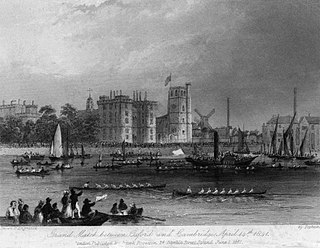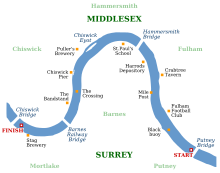The 4th Boat Race took place on the River Thames on 15 April 1840. It was the third of the University Boat Races to be held on the Thames, between Westminster Bridge and Putney Bridge. Oxford University Boat Club was formed to assist in the selection of the Oxford crew. Nevertheless, Cambridge won the race by three-quarters of a length to lead the overall record at 3–1.

The 5th Boat Race took place on the River Thames on 14 April 1841. It was the fourth of the University Boat Races, a side-by-side rowing competition between the University of Oxford and the University of Cambridge, to be contested in London. The race was held between Westminster Bridge and Putney Bridge and was won by Cambridge, whose crew featured two pairs of brothers rowing, who defeated Oxford by a distance of 22 lengths in a time of 32 minutes and 30 seconds. The victory took the overall record in the event to 4–1 in Cambridge's favour.
The 33rd Boat Race between crews from the University of Oxford and the University of Cambridge took place on the River Thames on 8 April 1876. Six of the Oxford crew had Boat Race experience while Cambridge's crew contained three Blues. Umpired by Joseph William Chitty, Cambridge won the race "easily" in a time of 20 minutes 20 seconds, following confusion as to the positioning of the finish. The victory took the overall record to 17–16 in Oxford's favour.
The 6th Boat Race took place on the River Thames on 11 June 1842. The Boat Race is a side-by-side rowing race between crews from the Universities of Oxford and Cambridge. In a race substantially interrupted by river traffic, Oxford beat Cambridge by a distance of 4+1⁄2 lengths.
The 7th Boat Race took place on the River Thames on 17 March 1845. The Boat Race is a side-by-side rowing race between crews from the Universities of Oxford and Cambridge. It was the first time the event was contested along The Championship Course, from Putney to Mortlake. The race was won by Cambridge who beat Oxford by a distance of ten lengths.
The 8th Boat Race between crews from the University of Oxford and the University of Cambridge took place on the River Thames on 3 April 1846. Umpired by Charles Jasper Selwyn, Cambridge won in a time of 21 minutes 5 seconds, with a winning margin of three lengths. The race was held on the ebb tide, starting in Mortlake and ending in Putney. For the first time, outriggers were used by both crews.
The 12th Boat Race took place on the River Thames on 8 April 1854. Typically held annually, the event is a side-by-side rowing race between crews from the Universities of Oxford and Cambridge. The race was won by Oxford who triumphed over Cambridge by seven lengths.
The 13th Boat Race took place on the River Thames on 15 March 1856. Typically held annually, the event is a side-by-side rowing race between crews from the Universities of Oxford and Cambridge. The race, the second to be held on the ebb tide, was won by Cambridge who beat Oxford by half a length.
The 15th Boat Race took place on the River Thames on 27 March 1858. Typically held annually, the event is a side-by-side rowing race between crews from the Universities of Oxford and Cambridge. The 1858 race, disrupted by poor rowing and a collision with a barge, was won by Cambridge, who defeated Oxford by 7+1⁄2 lengths in a time of 21 minutes 23 seconds.
The 19th Boat Race between crews from the University of Oxford and the University of Cambridge took place on the River Thames on 12 April 1862. Oxford won by 10 lengths in a time of 24 minutes and 34 seconds, taking the overall record to 10–9 in Cambridge's favour.
The 21st Boat Race, an annual side-by-side rowing race between crews from the Universities of Oxford and Cambridge along the River Thames, took place on 14 March 1864. Umpired by Joseph William Chitty, Oxford won by nine lengths in a time of 21 minutes 4 seconds, the fastest winning time since the event was held on The Championship Course in 1845. The race, whose start was moved in order to avoid interruptions from river traffic, was witnessed by the Prince of Wales.
The 22nd Boat Race between crews from the University of Oxford and the University of Cambridge took place on the River Thames on 8 April 1865. Oxford won by four lengths in a time of 21 minutes 24 seconds. The race, described as "one of the most sensational races in this history" thus far, was umpired by Joseph William Chitty. It was the first time that a crew had won the Boat Race after being behind at Hammersmith Bridge.
The 23rd Boat Race took place on the River Thames on 24 March 1866. The Boat Race is a side-by-side rowing race between crews from the Universities of Oxford and Cambridge. Oxford won by three lengths in a time of 25 minutes and 35 seconds, one of the slowest times in the history of the event.
The 24th Boat Race between crews from the University of Oxford and the University of Cambridge took place on the River Thames on 13 April 1867. In a race where the lead was exchanged several times, Oxford won by half a length in a time of 22 minutes and 39 seconds. The victory took the overall record to 14–10 in Oxford's favour.
The 25th Boat Race between crews from the University of Oxford and the University of Cambridge took place on the River Thames on 4 April 1868. Oxford won by six lengths in a time of 20 minutes and 56 seconds, taking the overall record to 15–10 in their favour. Oxford cox Charles Tottenham became the first person in the history of the event to win five Boat Races, and Cambridge saw their first non-British rower compete.
The 26th Boat Race between crews from the University of Oxford and the University of Cambridge took place on the River Thames on 17 March 1869. Oxford won by three lengths in a time of 20 minutes and 4 seconds. It was their ninth consecutive victory and was, at that point, the fastest time ever recorded in the event.

The 27th Boat Race between crews from the University of Oxford and the University of Cambridge took place on the River Thames on the 6 April 1870. Cambridge won by 1+1⁄2 lengths in a time of 22 minutes 4 seconds, their first victory since the 1860 race.
The 45th Boat Race took place on 24 March 1888. The Boat Race is an annual side-by-side rowing race between crews from the Universities of Oxford and Cambridge along the River Thames. In the race umpired by Robert Lewis-Lloyd for the final time, Cambridge won by seven lengths in a time of 20 minutes 48 seconds.

The 75th Boat Race took place on 24 March 1923. Held annually, the Boat Race is a side-by-side rowing race between crews from the Universities of Oxford and Cambridge along the River Thames. Cambridge's crew was marginally heavier than Oxford's, the latter included an Olympic silver medallist. Cambridge went into the race as reigning champions, having won the previous year's race. In this year's race, umpired by former rower Frederick I. Pitman, Oxford won by three-quarters of a length in a time of 20 minutes 54 seconds, securing their first win in five years. The victory took the overall record in the event to 40–34 in their favour.
The 80th Boat Race took place on 28 March 1928. Held annually, the Boat Race is a side-by-side rowing race between crews from the Universities of Oxford and Cambridge along the River Thames. In a race umpired by former Oxford rower Charles Burnell, Cambridge won by ten lengths, the largest margin of victory since 1900, in a time of 20 minutes 25 seconds. The victory took the overall record to 40–39 in Oxford's favour.







